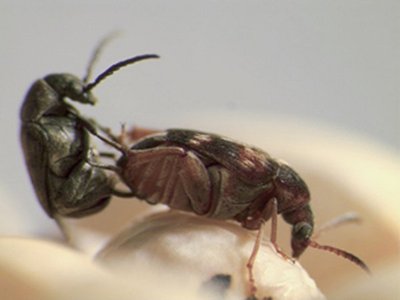Size does matter - well it does for beetles
Microscale laser surgery on male beetles’ genitalia has been used to establish that for beetles size actually does matter.
A collaborative project has, for the first time, demonstrated experimentally the evolutionary force behind the rapid evolution of male genitals. According to a recent paper by researchers from the University of Cincinnati and Uppsala University, the size of genital spines has a measurable effect on sexual success in beetles.
Mating among seed beetles (Callosobruchus maculatus) involves several males engaging in copulation with individual females.
“When a female mates with several males, the males compete over the fertilisation of her eggs,” said Michal Polak, associate professor of biological sciences at the University of Cincinnati. “Because females mate with multiple males, the function of the male copulatory organ may determine which of the males will fertilise most of her eggs. Our results show that the morphology of the male genitalia affects his fertilisation success in these beetles.”

The competition to produce offspring is the driving force of evolution. Competition among males occurring after insemination may be an important evolutionary force that has led to the evolution of a diversity of shapes and sizes of male sexual organs, the co-authors assert. This competition among males has generated a great biological diversity that they believe can directly contribute to the formation of new species.
“The reproductive organs of animals with internal fertilisation change more rapidly than all other morphological features during evolution,” Polak said. “In virtually all groups of animals, from roundworms and molluscs to reptiles and mammals, the male sex organs differ markedly among even closely related species, with female genital traits remaining relatively unchanged.”
To experimentally investigate the role of genital shape in reproductive success, the Swedish researchers - Cosima Hotzy, Goran Arnqvist and Johanna L Ronn - bred male beetles with extraordinarily long genital spines. They simultaneously bred male beetles with extremely small spines. Experiments demonstrated that the males with long spines produced substantially more offspring.
“It is possible, however, that breeding for long spines introduced a secondary trait that affects fertility,” Polak said. Unintended consequences, he said, are well known to animal breeders.
To prove that it was the spines and not some other trait, some beetles had their genital spines surgically modified using microscale laser surgery. Polak’s laboratory has gained an international reputation for using a precision laser system to make microscopic changes to insect bodies.
Insects modified through both methods were then observed throughout the competitive mating process. The international team found that the longer genital spines directly contributed to successful fertilisation. Seminal fluid from the males was also tracked through high-resolution radioisotope labels and shown to enter the female body more quickly after mating with long-spined males than short-spined males.
“This provides experimental evidence that male genital morphology influences success in postcopulatory reproductive competition,” Polak said.
There is more work to be done, Polak said, to understand the mechanism at work here. It is possible that these longer spines help introduce bio-active molecules from seminal fluid into the female circulatory system. These added proteins and peptides, which have yet to be characterised, may create effects within the female that contribute to male reproductive success. It is also possible that genital spines exert mechanical effects within the female by stimulating her reproductive tract during copulation, thereby inducing the female to uptake and use more of her current mate’s sperm.
European Space Agency inaugurates deep space antenna in WA
The ESA has expanded its capability to communicate with scientific, exploration and space safety...
Black hole collision supports Hawking's landmark theory
Astrophysicists have witnessed a collision between two black holes that was so loud, they were...
Uncovering differences in wild and domesticated crops
Researchers have revealed insights into the genetic make-up of wild varieties of common crops...





